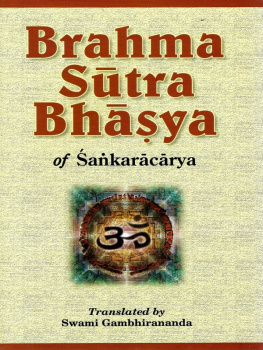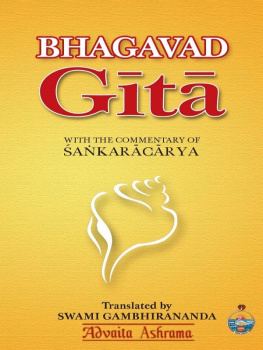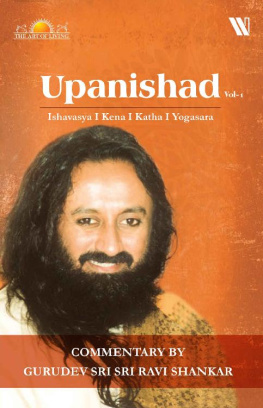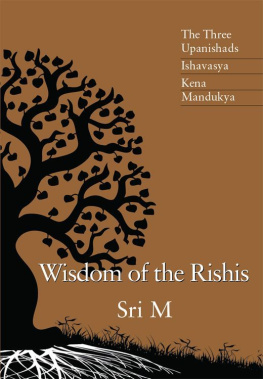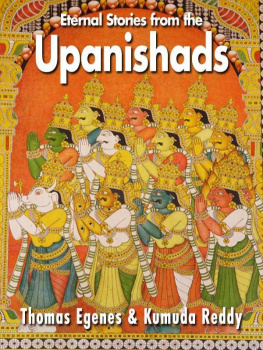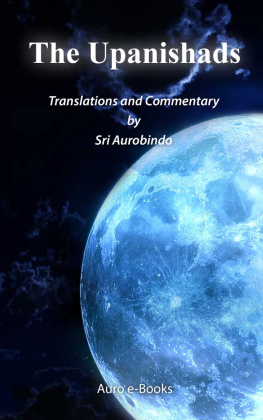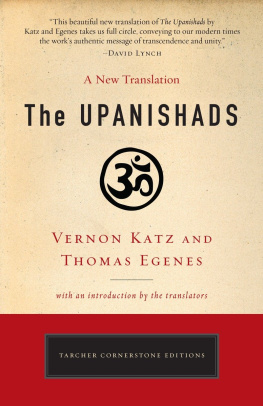





We are happy to say that this second edition of the Eight Upani.snds, volume one, has been thoroughly revised by the translator himself.

The present attempt aims at making the thoughts of the great saint and philosopher Sri Sankaracarya available to those readers who are either unfamiliar with Sanskrit or, though fairly acquainted with it, prefer the medium of another language for a better understanding. It is very difficult to present such an abstruse philosophy through translation, when the language into which it is rendered differs so widely in form and in spirit from the original. We have still tried to be as literal and as true to the spirit and sequence of the sentences, as the English language would pen-nit, without compromising comprehension.
In the translation of the commentary we have presented in italics the words quoted from the text by Sahkaracarya. These are followed by commas and the English equivalents, the explanatory words and passing remarks being separated from the synonyms by semicolons or dashes. The words of the text along with their synonyms, are separated by semi-colons from other words. A full-stop marks the end of a group of connected words in the text. Readers unfamiliar with Sanskrit may skip over these italicised words; and still they will get fairly self-contained sentences to convey the ideas of the commentary in full.
We have been laid under a deep debt of gratitude by Swami Omkarananda, who kindly edited the HR Upanisad. Our thanks are also due to many others who helped us in various ways in executing this work.
In transliteration we have followed the international system with which the readers of the masterly translation of the Brhadaranyaka Upanisad by Swami Madhavananda are familiar.

I
Sounds like

Sounds like




Om. That (supreme Brahman) is infinite, and this (conditioned Brahman) is infinite. The infinite (conditioned Brahman) proceeds from the infinite (supreme Brahman). (Then through knowledge), realizing the infinitude of the infinite (conditioned Brahman), it remains as the infinite (unconditioned Brahman) alone.
(See Br. 5.1.1. )
Om! Peace ! Peace ! Peace !
ISA UPANISAD
Introduction: The (Vedic) mantras (verses) beginning with Tsdvasyam have not been utilized in karma (rituals etc.), for they serve to reveal the true nature of the Self, which is not an appendage to karma. And the real nature of the Self consists in" Its purity, sinlessness, oneness, eternity, incorporeity, omnipresence, etc., which will be indicated later on (8). As that (nature) would conflict with karma, it is but natural that the verses are not applied to karma; for neither is the real nature of the Self, as defined, a thing to be created, transformed, achieved, or purified, nor is it of the nature of an agent or enjoyer, whereby it could become a factor in karma. Moreover, all the Upanisads exhaust themselves simply by determining the true nature of the Self, and the Gita and the scriptures dealing with moksa (the emancipation of the soul) have only this end in view. Accordingly karmas have been enjoined by assuming such qualities for the Self as multiplicity, agentship, enjoyership, etc., and impurity, sinfulness, etc., which common sense takes for granted. For people who are versed in the science dealing with competence (of people treading this path), verily say that that man is qualified for karma when he hankers after the results of karma, be they of this world in the form of spiritual eminence etc., or of the hereafter in the form of heaven etc., and thinks of himself thus: `I am a twice-born man and am free from such defects as being one-eyed or hump-backed which stand in the way of one's competence for

1. Om. All this-whatsoever moves on the earthshould be covered by the Lord. Protect (your Self) through that detachment. Do not covet anybody's wealth. (Or-Do not covet, for whose is wealth?)
and not for karma. Tena tyaktena, through that detachment. Tyaktena means, through detachment, (and not `by any abandoned thing') ; for, a son or a servant, when abandoned or dead, does not protect one, since he has no connection with oneself. So the meaning of the Vedic word (tyaktena) is indeed this - `through renunciation'. Bhu ijithah, protect. You who have thus renounced desires, ma grdhah, do not covet, do not cherish any desire for wealth. Do not long for kasya said, anybody's -either your own or somebody else's; dhanam, wealth -this is the meaning. The word suit is a meaningless particle. Or the meaning is this: Do not covet. Why? Kasya said dhanam, whose is wealth?-this (question) is used in the sense of denial, because nobody has any wealth which can be coveted. The idea is this: Everything has been renounced through this thought of the 'Lord'-'All this is but the Self -,so that all this belongs to the Self, and the Self is all. Therefore do not have any hankering for things that are unreal.
So far as the knower of the supreme Self is concerned, the purport of the Vedic text (i.e. of the first verse) is this: that the Self is to be saved through firm devotedness to the knowledge of the Self after the renunciation of the threefold desire for sons etc. As for the other person who is unable to cognize the Self because of his mental preoccupation with the nonSelf, the Vedic text (i.e. the second verse) imparts this instruction:


